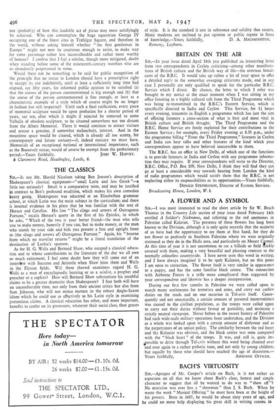THE CLASSICS
SIR,—Is not Mr. Harold Nicolson taking Ben Jonson's description of Shakespeare's classical equipment—" small Latin and less Greek "—a little too seriously? Small is a comparative term, and may be justified in contrast to Ben's profound erudition, which makes his own comedies heavy going. Shakespeare was educated at an Elizabethan grammar school, at which Latin was the main subject in the curriculum; and there is internal evidence in his plays that he was familiar with the text of Horace and Catullus. His line " The slings and arrows of Outrageous Fortune," recalls Horace's query in the first of his Epistles, - in which he asks, " Which of the two is your better friend—the man who tells you to make money, honestly if you can, but to make money, or the man who stands by your side and bids you present a free and upright front to (the slings and arrows of) Outrageous Fortune." Again, his " bourne from which no traveller returns " might be a literal translation of the destination of Lesbia's sparrow.
As for H. G. Wells and Bernard Shaw, who escaped a classical educa- tion and to whose contributions to the literature of the day we all owe so much enjoyment, I feel some doubt how they will come out of an interview with Socrates and Aristotle when Shaw joins them and Wells in the Elysian fields. Will these shrewd examiners regard H. G. Wells as a man of encyclopaedic learning or as a sciolist, a prophet and preacher or a sophist? How will Bernard Shaw substantiate his youthful claims to be a greater dramatist than Shakespeare? I fear both will have an uncomfortable time, not only from their ancient critics but also from Sam Johnson, who will not mince matters in the robust Anglo-Saxon idiom which he could use as effectively as his Latin style in examining pretentious claims. A classical education has other, and more important, benefits to confer on its posessors, whatever their social class, than graces
of style. It is the standard it sets in substance and solidity that counts. Many moderns are inclined to put opinion or public repute in front


































 Previous page
Previous page